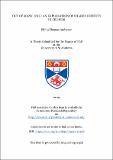Files in this item
Out of Many, One: An Exploration of Shared Identity in Crowds
Item metadata
| dc.contributor.advisor | Reicher, Stephen | |
| dc.contributor.author | Anderson, Philip Thomas | |
| dc.coverage.spatial | iv, 260 p. | en_US |
| dc.date.accessioned | 2019-03-18T15:38:03Z | |
| dc.date.available | 2019-03-18T15:38:03Z | |
| dc.date.issued | 2019-06-28 | |
| dc.identifier.uri | https://hdl.handle.net/10023/17308 | |
| dc.description.abstract | In a crowd, people sometimes experience a feeling of togetherness and one-ness in which the crowd comes to be seen as ‘we’ and ‘us’ rather than ‘they’ and ‘them’. This thesis explores the psychological process that underlies this feeling of one-ness through the shared identity model of crowd behaviour. Part of the social identity tradition, the shared identity model makes a key distinction between a social identity that is shared, and a shared identity. The former is instantiated in the representational sense that ‘I am an X’ where X stands for a social category, while the latter is instantiated in the meta-representational sense that ‘We are all Xs together’, a reciprocal recognition of the identity of the self and others. Qualitative methods, including immersion in crowd events, participant observation, semi-structured interviews both in the field and otherwise, audio diaries, photo-elicitation and focus group discussions were used to explore shared identity in political crowds and in music festival crowds. Field interviews were conducted at three climate change protests, and three focus groups were recruited to discuss their experiences at Scotland’s Climate March 2015. Eighteen participants were recruited for semi-structured interviews about their music festival experiences. All interviews and group discussions were transcribed and analysed using a form of thematic analysis. The results showed evidence of shared identity in the form of participants’ descriptions of ‘we-ness’ and ‘one-ness’, feelings of belonging and feelings of love for others, including strangers, in the crowd. Factors which lead people to perceive themselves as sharing identity, such as synchronised behaviours and shared emotions, and factors that may be consequences of shared identity, including relational and emotional transformations were identified. The results demonstrate that shared identity is by no means an automatic state, but a nuanced, sometimes subtle and often variable process. | |
| dc.description.sponsorship | "This work was supported by the Economic and Social Research Council, grant number 1358748." - Acknowledgements | en |
| dc.language.iso | en | en_US |
| dc.publisher | University of St Andrews | |
| dc.relation | Out of many, one: An exploration of shared identity in crowds (thesis data) Anderson, P.T., University of St Andrews, 29 January 2019 DOI: https://doi.org/10.17630/b70f34e0-feb4-4fda-b733-03da1fab4935 | en |
| dc.relation.uri | https://doi.org/10.17630/b70f34e0-feb4-4fda-b733-03da1fab4935 | |
| dc.subject | Crowds | |
| dc.subject | Social identity | |
| dc.subject | Shared identity | |
| dc.subject.lcc | HM871.A6 | |
| dc.title | Out of Many, One: An Exploration of Shared Identity in Crowds | en_US |
| dc.type | Thesis | en_US |
| dc.contributor.sponsor | Economic and Social Research Council (ESRC) | en_US |
| dc.type.qualificationlevel | Doctoral | en_US |
| dc.type.qualificationname | PhD Doctor of Philosophy | en_US |
| dc.publisher.institution | The University of St Andrews | en_US |
| dc.rights.embargoreason | Embargo period has ended, thesis made available in accordance with University regulations. | en |
| dc.identifier.doi | https://doi.org/10.17630/10023-17308 |
This item appears in the following Collection(s)
Items in the St Andrews Research Repository are protected by copyright, with all rights reserved, unless otherwise indicated.

